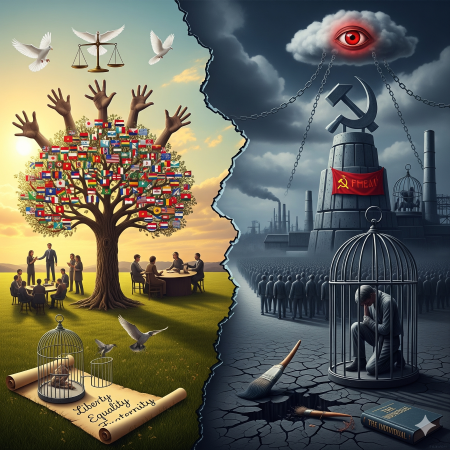In practice, why have both democracy and communism often failed to live up to their ideals?

Both democracy and communism have struggled to live up to their ideals in practice because of the inherent flaws in human nature and the challenges of large-scale implementation.
Neither ideology fully accounts for the realities of power, self-interest, and the complexities of human society.
Democracy's Practical Failures
The democratic ideal is that a government "of the people, by the people, and for the people" will reflect the collective will and best interests of its citizens.
In practice, this often falls short due to several factors:
-
Political Polarization and Partisanship: Instead of fostering a collaborative exchange of ideas, democracy can devolve into intense partisan battles. Political opponents are often viewed as enemies, and the focus shifts from finding common ground to simply defeating the other side, which erodes trust and makes it difficult to pass meaningful legislation.
-
The Influence of Wealth and Special Interests: While a core ideal of democracy is equality, in reality, wealthy individuals and powerful corporations can exert disproportionate influence through lobbying, campaign donations, and media control. This can lead to policies that favor a few at the expense of the many, undermining the principle of "one person, one vote."
-
Voter Apathy and Disengagement: The democratic process requires active participation. When citizens are apathetic, disillusioned, or simply too busy to engage, it can lead to low voter turnout. This means that a small, highly motivated minority can disproportionately influence election outcomes, and elected officials may not truly represent the majority of the population.
-
The Tyranny of the Majority: While majority rule is a cornerstone of democracy, it can, in some cases, lead to the oppression of minority groups. If the majority votes to enact laws that infringe upon the rights or well-being of a minority, the system fails to protect all of its citizens.
Communism's Practical Failure.
The communist ideal, as articulated by thinkers like Karl Marx, envisioned a classless, stateless society where the means of production are owned collectively and resources are distributed according to need.
The reality of 20th-century communist states was starkly different, mainly due to:
-
Authoritarianism and Totalitarianism: The theory of a "dictatorship of the proletariat" to transition to a classless society often became a permanent, oppressive one-party rule. This concentration of power led to the suppression of individual liberties, censorship, political repression, and often, mass purges. The state became an all-powerful entity, not one that was meant to "wither away."
-
Economic Inefficiency: Central planning, where the government controls all aspects of the economy, proved to be an inefficient and unproductive system. Without a market-based price mechanism, it's impossible to accurately gauge supply and demand. This led to chronic shortages of consumer goods, surpluses of unneeded products, and a lack of innovation.
-
Lack of Incentives: By eliminating private property and the profit motive, communist systems removed the primary incentive for individuals to work harder or innovate. Why put in extra effort when everyone receives the same compensation regardless of their contribution? This often resulted in low productivity, stagnation, and widespread corruption.
-
Human Nature and Self-Interest: Communism's ideals rely on a fundamental shift in human nature, from self-interest to a selfless devotion to the collective good. This proved to be an unrealistic and utopian assumption. In practice, those who held power exploited the system for personal gain, and a new, often more brutal, class-based hierarchy emerged, contrary to the ideology's core principle of equality.
- Questions and Answers
- Opinion
- Motivational and Inspiring Story
- Technology
- Live and Let live
- Focus
- Geopolitics
- Military-Arms/Equipment
- Sicurezza
- Economy
- Beasts of Nations
- Machine Tools-The “Mother Industry”
- Art
- Causes
- Crafts
- Dance
- Drinks
- Film/Movie
- Fitness
- Food
- Giochi
- Gardening
- Health
- Home
- Literature
- Music
- Networking
- Altre informazioni
- Party
- Religion
- Shopping
- Sports
- Theater
- Health and Wellness
- News
- Culture

